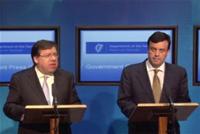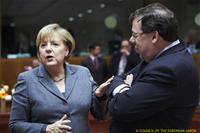Ireland will after all receive financial assistance from the EU and the IMF
Ralitsa Kovacheva, November 22, 2010
 Late last night Ireland confirmed that it has made a formal request for financial assistance from the EU and the IMF, which has been approved instantly by euro area finance ministers. Although at this stage the exact amount of the funding is not clear, it will probably be around 80-90 billion euro for three years and, after the words of the Irish Finance Minister Brian Lenihan, it will in no case be "a three-figure sum".
Late last night Ireland confirmed that it has made a formal request for financial assistance from the EU and the IMF, which has been approved instantly by euro area finance ministers. Although at this stage the exact amount of the funding is not clear, it will probably be around 80-90 billion euro for three years and, after the words of the Irish Finance Minister Brian Lenihan, it will in no case be "a three-figure sum".
Although the programme, under which the country would receive financial aid, is still not finalised, it was important the news to be announced before markets open on Monday. On November 18th, a technical EU-IMF mission arrived in Dublin, which enhanced market expectations of an impending help agreement. And like the Greece case, it was announced on Sunday evening in order to catch the reaction of markets at the beginning of the week. The markets' pressure on Ireland in recent weeks has spread to other so-called “peripheral” economies in the eurozone, such as Spain and Portugal, who called on Ireland to surrender and to accept external help so that the interest rates on their loans could drop.
This is why EU finance ministers' reaction is understandable as they welcomed the Irish request and supported it in relief because it will “safeguard financial stability in the EU and in the euro area”. In a statement of the Eurogroup and ECOFIN it is noted, that perhaps the financial support provided by the EU and the IMF, will be complemented by bilateral loans from Britain and Sweden, who have expressed such willingness.
The Financial Times quoted data of the Bank for International Settlements, according to which, the three largest creditors to the Irish economy by the end of June - including to the Irish government, banks and non-financial corporations – were Germany with 109 billion euro, the United Kingdom -100 billion euro and France - 40 billion euro. Against this background, a sense of relief from the decision of the Irish authorities, was not surprising.
The policy programme, under which Ireland will receive the loan, will be based on fiscal consolidation measures and structural reforms, as set out in the government’s 4-year budgetary strategy, which is expected to be ready this week. The aim is “to achieve fiscal consolidation of 6 billion euro in 2011 as part of a strategy leading to a 3% of GDP deficit by 2014, implying an overall consolidation of 15 billion euro in the 4-year strategy”. The country’s budget deficit currently threatens to reach a record high of 32% per cent, because of the enormous resources the government must pour in restructuring the banking system. It is this sector exactly that much of the funds, which Ireland will receive from the EU and the IMF, will be directed to.
"The agreement will include a fund for potential future capital needs of the  banking sector. Put simply, the Irish banks will become significantly smaller than they have been in the past so that they can gradually be brought to stand on their own two feet once more", Prime Minister Brian Cowen said.
banking sector. Put simply, the Irish banks will become significantly smaller than they have been in the past so that they can gradually be brought to stand on their own two feet once more", Prime Minister Brian Cowen said.
In this sense, the European Central Bank has also expressed its satisfaction with the agreement, because the institution has repeatedly noted, that the government in Dublin has to ask for a loan and restructure the banking sector alone, rather than relying on the ECB to continue pouring liquidity into Irish banks. The IMF also welcomed the decision of the EU and the Eurogroup to approve the Irish request for funding and expressed its readiness to participate in joint efforts, “including through a multi-year loan”. “An IMF team, currently in Ireland for technical talks, will now begin to hold swift discussions on an economic programme with the Irish authorities, the European Commission, and the European Central Bank.”
 Although the conditions for financial assistance are still not clear, it is likely these to resemble those in the Greek programme –with a strong conditionality and a low interest. According to the Irish Government, “the issue of changing Ireland’s rate of Corporation Tax does not arise”. Perhaps, however, the country will raise the income tax. According to European media, there was a notably high pressure on Ireland to increase the corporate tax and this was one of the reasons why the country resisted for so long before requesting external funding.
Although the conditions for financial assistance are still not clear, it is likely these to resemble those in the Greek programme –with a strong conditionality and a low interest. According to the Irish Government, “the issue of changing Ireland’s rate of Corporation Tax does not arise”. Perhaps, however, the country will raise the income tax. According to European media, there was a notably high pressure on Ireland to increase the corporate tax and this was one of the reasons why the country resisted for so long before requesting external funding.
"The second key element of the agreement will be a programme to reduce our budget deficit. Again, put simply, the Government has to increase our taxes and reduce our spending to levels we can afford”, the Irish prime minister explained to his countrymen.
The Irish loan will be be financed by the European Financial Stabilisation Mechanism (EFSM) and the European Financial Stability Facility (EFSF), which have been created in May in order to save Greece. Under the mechanism, the states can receive up to 770 billion euro from the European Commission, the IMF and the EFSF. The European financial stability facility has been established as a company in Luxembourg and will raise market funding of up to 440 billion euros, guaranteed by the euro area members. The EFSF has obtained the highest possible credit rating (AAA), which means that it will be financed under the most favourable conditions. Last week EFSF CEO Klaus Regling said, that there was considerable interest, especially from Asian investors, in the Fund's instruments.
It is noteworthy that in all their comments last week, both the Irish and other European leaders strongly emphasized on the differences with Greece – in Ireland's case it is not about falsified statistics, corruption and devastated public finances, but rather about restructuring the banking sector, which has been seriously affected by the financial crisis. At the bottom of the banking problems is the real estate bubble, which ultimately will prove to be the top driver of the so-called "Irish economic miracle." Obviously the message is, that in this case help is not only useful and necessary, but is also morally justified - to support the efforts of the Irish Government to safeguard financial stability in the country and in the euro area as a whole.
Last but not least – it is also about demonstrating the need of a permanent rescue  mechanism for the euro area, of which Germany must convince the other EU countries by December 16. Perhaps at the European Council then, Ireland will be a strong argument in favour of Ms Merkel's position that it is necessary not just to help troubled countries, but to have guarantees for the overall stability of the euro area. EU leaders have to decide quickly and clearly on the creation of the permanent rescue fund and in particular – how the private sector will participate in it, in order to ease market pressure in anticipation of an upcoming third crisis in the eurozone - in Portugal.
mechanism for the euro area, of which Germany must convince the other EU countries by December 16. Perhaps at the European Council then, Ireland will be a strong argument in favour of Ms Merkel's position that it is necessary not just to help troubled countries, but to have guarantees for the overall stability of the euro area. EU leaders have to decide quickly and clearly on the creation of the permanent rescue fund and in particular – how the private sector will participate in it, in order to ease market pressure in anticipation of an upcoming third crisis in the eurozone - in Portugal.
 Klaus Regling | © Council of the EU
Klaus Regling | © Council of the EU Mario Centeno | © Council of the EU
Mario Centeno | © Council of the EU Mario Centeno | © Council of the EU
Mario Centeno | © Council of the EU Angela Merkel, Emmanuel Macron | © Council of the EU
Angela Merkel, Emmanuel Macron | © Council of the EU Benoit Coeure | © Council of the EU
Benoit Coeure | © Council of the EU Pierre Moscovici | © Council of the EU
Pierre Moscovici | © Council of the EU